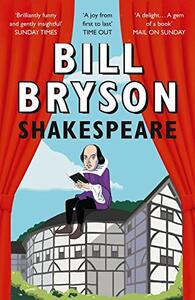Take a photo of a barcode or cover
informative
slow-paced
I thoroughly enjoyed reading this book as a light overview of the life of Shakespeare. Its very readable as I would expect from Bill Bryson and has a sense of humour that I enjoyed.
I was motivated to borrow this from the library after watching the BBC sitcom ‘Upstart Crow’ and realising I was probably missing out on some of the jokes!!
It’s amazing how little is known about Shakespeare’s life (the author points out at the start that this is a short book!) and it was interesting to consider how the little we do know can be added to and extrapolated to get to some of the popular truths that we take for granted.
I was motivated to borrow this from the library after watching the BBC sitcom ‘Upstart Crow’ and realising I was probably missing out on some of the jokes!!
It’s amazing how little is known about Shakespeare’s life (the author points out at the start that this is a short book!) and it was interesting to consider how the little we do know can be added to and extrapolated to get to some of the popular truths that we take for granted.
A lot to like here. But just too much speculation for me. We just don't know much at all about Shakespeare and we probably never will. I'm almost amused by the heated putdowns of all those who think it's possible that someone other than the actor from Stratford might have written the plays. Bryson maintains that there's not a bit of evidence (yet he does acknowledge that there have been 5,000 books written on this subject — clearly it's not just one or two kooks out there). Maybe there's no good evidence for an alternative author. I don't see a whole lot of evidence in favor of the actor either (and the wealth and range of his knowledge does seem somewhat unbelievable for that chap). But in the end, we can't know and it doesn't matter. Whoever wrote the plays was clearly brilliant and . . . why worry about who, exactly, it was?
funny
informative
Perfectly acceptable but not that exciting/different. I don't think I learned anything new.... I also missed the personal exploration aspect of most of Bryson's work.
Fun and quick read. Didn't irritate me as much as a lot of Bryson has been lately!
Shakespeare is a contradiction: we know so little about a man who wrote and gave us so much. Bill Bryson’s Shakespeare: The World at Stage is unlike most other works about him, but that’s its strength. Bryson doesn’t seek to alter scholarship on Shakespeare or force original reinterpretations of his works; and even though it is a biography he doesn’t claim to add any significant new information about him. (Actually, one of Bryson’s themes is that there is frustratingly too little to know about him.) Rather, it focuses on what we do know about this greatest of English writers. An appreciation or even familiarity with Shakespeare’s work is not needed; as with other Bryson books, Bryson tells the stories of heroes that have helped salvage his works and of villains that have jealously sought to destroy it.
There is much to learn and appreciate for those that haven’t previously read any of his plays, and yes, even for those that don’t care to do so. Bryson’s Shakespeare has no long-winded passages written in difficult English; rather it humanizes the man for those unfamiliar to him. At the same time, Bryson emphasizes just how significant and important Shakespeare has been and continues to be, giving us over 800 words that are still in common usage, and contributing significantly in the 17th century historical shift from Latin to English as the world’s lingua franca.
Of significance is the last chapter, where Bryson systematically refutes attempts to discredit Shakespeare as the author of the works that bear his name. Although these conspiracies are nothing new (Mark Twain thought Shakespeare’s work was actually that of Francis Bacon) the movement has unfortunately garnered recent momentum even in serious academic circles. There is absolutely no evidence that discredits Shakespeare as the author of the works that bear his name, while there is much evidence that affirms his authorship, Bryson argues. One of the many arguments of the conspiratorialists is that the breadth and scope of knowledge and human experiences of death, tragedy and yes, love, couldn’t have possibly been written by just one self-educated man. Given that they were, I would argue the conspiratorialists’ accusations are perhaps the greatest compliment to him; such was his genius.
Strongly recommended.
There is much to learn and appreciate for those that haven’t previously read any of his plays, and yes, even for those that don’t care to do so. Bryson’s Shakespeare has no long-winded passages written in difficult English; rather it humanizes the man for those unfamiliar to him. At the same time, Bryson emphasizes just how significant and important Shakespeare has been and continues to be, giving us over 800 words that are still in common usage, and contributing significantly in the 17th century historical shift from Latin to English as the world’s lingua franca.
Of significance is the last chapter, where Bryson systematically refutes attempts to discredit Shakespeare as the author of the works that bear his name. Although these conspiracies are nothing new (Mark Twain thought Shakespeare’s work was actually that of Francis Bacon) the movement has unfortunately garnered recent momentum even in serious academic circles. There is absolutely no evidence that discredits Shakespeare as the author of the works that bear his name, while there is much evidence that affirms his authorship, Bryson argues. One of the many arguments of the conspiratorialists is that the breadth and scope of knowledge and human experiences of death, tragedy and yes, love, couldn’t have possibly been written by just one self-educated man. Given that they were, I would argue the conspiratorialists’ accusations are perhaps the greatest compliment to him; such was his genius.
Strongly recommended.
I was so interested in Shakespeare after reading Hamnet by Maggie O'Farrell that I reached into my own library for more. Bryson writes a short history of Shakespeare by describing the few facts we know. He then describes how this knowledge is actually great in contrast to what we know about his contemporaries. Bryson brilliantly puts down the Shakespeare assumed identity conspiracies while giving excellent context for the times. This was a great companion to Hamnet and I can't wait to see a performance of Hamlet someday soon.
informative
lighthearted
reflective
medium-paced
informative
slow-paced




